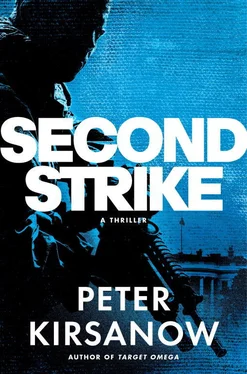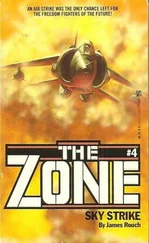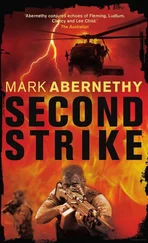An ambitious young major by the name of Volkov had created websites inspired by ISIS, al-Qaeda, Boko Haram—one more radical than the next. They featured lectures from scholars and exhortations from jihadists. Slickly produced videos were posted depicting the glories of jihad and the establishment of the caliphate. History lessons were presented, always with an abundance of maps and graphs, showing the incursions by the infidels over the centuries into lands not their own.
But the primary attraction of the websites, by far the principal driver of traffic, was their gruesome videos. Not just the standard fare offered by other radical sites, but scenes of depravity and evil incomprehensible to most in the West, particularly their supine elite. There were beheadings of Syrian and Iraqi soldiers. There were crucifixions of women and children, who writhed until death under the blistering sun. There were ghastly disembowelments that took hours, the victims kept conscious and their pain made more acute by repeated injections of stimulants. There were impalements on sharp stakes, the piercings creatively arranged like displays of fine art. And there were immolations, an attraction favored by the site’s visitors because of its multiple and varied camera angles.
Interspersed throughout the videos were reminders of the infidels’ degradations as well as invitations to join the fight against the West. Visitors to the site could enter encrypted chat rooms to discover how they might help the cause. There, unbeknownst to them, their conversations were processed through psychological evaluation programs to determine fitness for service and to weed out possible infiltration by agents of the CIA, MI6, DGSE, and other Western intelligence agencies.
Tens of thousands applied. They hailed from nearly every nation; men and women, young and old. Some fit the stereotypical profile of such applicants presented by Western politicians and the media—young, disturbed, estranged, or disaffected losers searching for purpose in life. But many were relatively successful, seemingly stable teachers, accountants, landscapers, clerks, physicians, pilots, students, and homemakers. Multitudes of them. The Western public would be astonished and alarmed by their number and diversity. Neighbors, friends, coworkers, and acquaintances—all aspiring combatants in the holy war.
The selection process had been arduous and time-consuming. Egorshin’s unit wasn’t simply looking for bodies. The main qualification was brains—more specifically, a proficiency with computers.
An applicant pool of thousands was winnowed to fifty the psych programs had identified as the most promising. Those fifty were the subjects of months of round-the-clock SVR surveillance and detailed background checks. From that number, a selection committee consisting of computer specialists, psychologists, and intelligence agents culled twenty-five semifinalists. Among them were Brits, Americans, Canadians, Belgians, and French. Some were Muslim; some were not. Each had indicated a willingness to sacrifice himself for the cause. More importantly, their psychological profiles confirmed the same. Each of the semifinalists was contacted in person by an SVR agent posing as a recruiter for ISIS or a similar terrorist group. Arrangements were made for travel to a Middle Eastern destination—one of two sites in Syria or Libya—for training.
The travel to the training sites was arranged to replicate that employed by terrorist recruiters. Drivers, escorts, and logicians emulated those from ISIS or its brethren. Nothing about the process gave the semifinalists even a hint that it was run from beginning to end by the SVR.
The training lasted several weeks. To the disappointment of some, there was no firearms training, no instruction in IEDs. There was a moderate amount of training regarding surveillance detection and evasion. But almost all of their time was devoted to computers and electronics.
Naturally, there was some attrition. Some disillusioned semifinalists asked to return home. Others sought to join different terrorist groups. And a few simply couldn’t make the cut and were sent packing. To ensure operational security, each of them was executed within minutes of their departure from the training sites. The remaining volunteers, numbering ten finalists, all male, all between nineteen and twenty-eight years of age, were completely unaware of their comrades’ fate.
Now they were in the land of the Great Satan on the cusp of fulfilling a great and historic mission. And yet there was murmuring in the rear of the van.
Bor knew that all of the training, psychological profiles, and computer simulations in the world couldn’t predict with certainty how recruits would act when actually in the field. Allowed to continue and perhaps escalate, the murmuring would lead to dissent, which could negatively affect, if not jeopardize, the mission.
That was unacceptable.
Most of the backseat discussion appeared driven by Rasul Baslaev. He was the eldest and had emerged as the unofficial leader of the volunteers. He was originally from Dagestan in the Caucasus, just north of Azerbaijan, where his family still resided. He had moved to London and was a university graduate, but after a series of short-lived jobs, he’d been unemployed for almost three years.
Their jitters were understandable. They were close to the time of execution. They had seen Bor kill several people in the last twenty-four hours. That was done to ensure obedience.
But Bor believed it would be helpful to give them some encouragement also. It would be most effective if he focused such encouragement on Baslaev, the leader, and let it trickle down from him to the others.
Bor turned sideways in his seat to address Baslaev. The whispers stopped and the volunteers looked on with apprehension.
“Are you getting nervous, Rasul? Having misgivings, second thoughts?”
“No, Teacher.” Several of the other volunteers also shook their heads in denial.
“There’s no shame in it, Rasul. It happens to all of us. You wouldn’t be human if you weren’t more than a little anxious.”
“Who were the old couple?” Baslaev asked.
“I see.” Bor nodded. “What you see as the unnecessary expenditure of life troubles you. I assure you, I wouldn’t have done it if it wasn’t necessary.”
“They were infidels?”
“In a manner of speaking,” Bor replied.
“You killed them?”
“The house caught fire.”
“But they provided assistance to us.”
“I made a judgment, Rasul. Perhaps it was in error, but I did what I thought was best. It might have been better had I first talked to you about it.”
“We were surprised, Teacher. That’s all.” The others nodded agreement.
Bor looked at his watch. They were still ahead of schedule and making good time. He scanned the road ahead.
“You’ve worked hard. You deserve an explanation.” He looked to the driver and pointed ahead. “Pull off on that road up ahead. Let’s take a break and discuss this.”
A faint smile crossed Baslaev’s face. The other volunteers broke out in grins.
MOSCOW,
AUGUST 15, 11:18 P.M. MSK
Egorshin took the encrypted call while seated at his desk drinking tea and reviewing information in preparation for the event. The enormity of the undertaking was overwhelming. Petabytes of data were involved. They had run countless simulations over several months. Recalibrated, tweaked, and refined their calculations. For the last month every simulation yielded the same results. Save for inconsequential deviations to account for uncontrollable atmospheric variables, every simulation was a success. Most gratifying was the success of yesterday’s dry run for the secondary plan, involving a flight from Salt Lake City to Seattle.
Читать дальше












